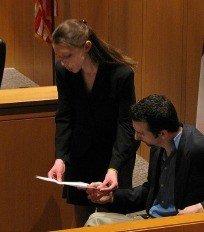

Real-life Columbus divorce trials bear little resemblance to courtroom proceedings shown in movies and television series. For one thing, as with most family law hearings in Ohio, no jury decides the case. Only a judge rules on the matters raised by the plaintiff — the man or woman who filed for divorce — and the defendant.
Another significant difference is that months of divorce trial preparation eliminate the types of dramatic surprises that highlight most Hollywood depictions of legal proceedings. Several rounds of making and taking depositions, commissioning reports from expert witnesses, and negotiating or engaging in mediation with the intent of never actually appearing in divorce court precede any date with a judge to secure a final decision.
When a divorce trial starts, it progresses through the stages outlined below.
Opening Statements
Both the plaintiff and the defendant are given opportunities to address the court before any testimony or evidence is presented. Divorce lawyers usually make the opening statements on behalf of their clients, using the time to briefly explain why their client has the stronger case.
Presentation of Plaintiff’s Evidence
Proper divorce trial preparation enables a man or woman to give compelling testimony and offer convincing exhibits and reports. If a plaintiff testifies in person, he or she is placed under oath and generally asked questions that have already been answered during depositions. Family members and friends can testify in support of the plaintiff, as can expert witnesses. Understanding how assets get divided in divorce of older couples
Working closely with an experienced and knowledgeable Columbus divorce attorney will help identify and arrange testimony from expert witnesses such as
Presentation of Defendant’s Evidence
The defendant has the same opportunity as the plaintiff to make his or her case. He or she may call all the same types of personal and expert witnesses. During both the plaintiff’s and defendant’s presentations, opposing lawyers are permitted to ask questions of witnesses.
Rebuttals
After the defense rests, the plaintiff is allowed to rebut certain statements, exhibits, and reports. The defendant is given the same chance to specifically rebut assertions made by the plaintiff.
Closing Statements
Divorce attorneys use closing statements as their last chance to draw the judge’s attention to the evidence that is most favorable to their client. They also point out errors, inconsistencies and weaknesses in the evidence presented by the other side.
Judge’s Ruling
A divorce court judge has the final say on all matters between the plaintiff and defendant. The judge’s rulings on whether to legally end the marriage, award custody, grant parenting time, and set amounts and schedules for child support and spousal support are final. Depending on what the judge was asked to decide, the divorce ruling may also contain orders regarding the distribution of financial assets and property. Appealing a divorce decision is possible but difficult because the person who files the appeal must point to specific errors made by the court or the judge.
If your divorce appears to be headed for court in Columbus or Franklin County, consider calling E.F. Whipps and Associates to ask if we can help. Our attorneys excel at divorce trial preparation, and we work with both plaintiffs and defendants. You can request a consultation online or call us at (614) 461-4006.
July 28, 2014
Edward F. Whipps & Associates is excited to announce that on August 1, 2014, we will have a new and…
READ MORE >>